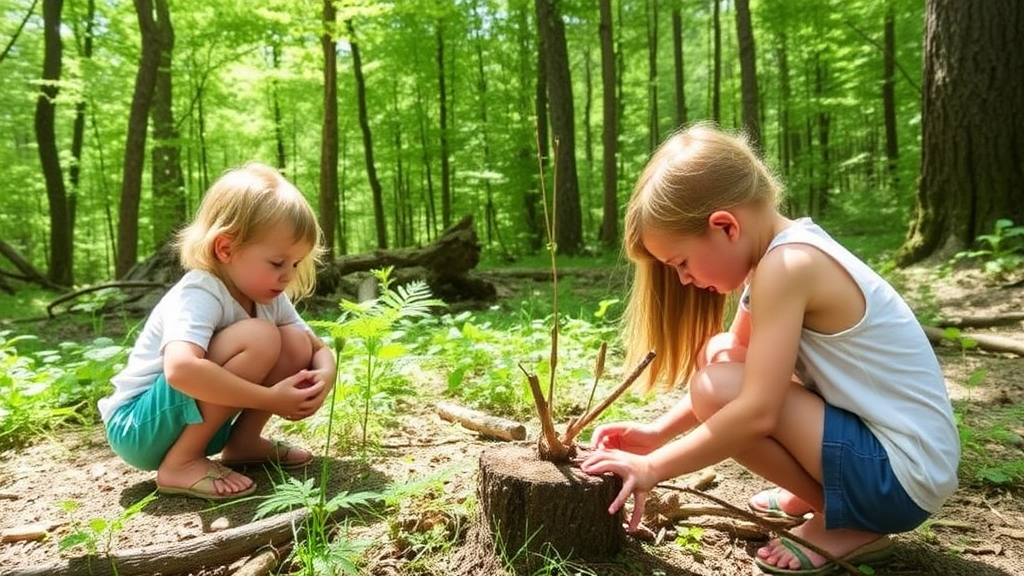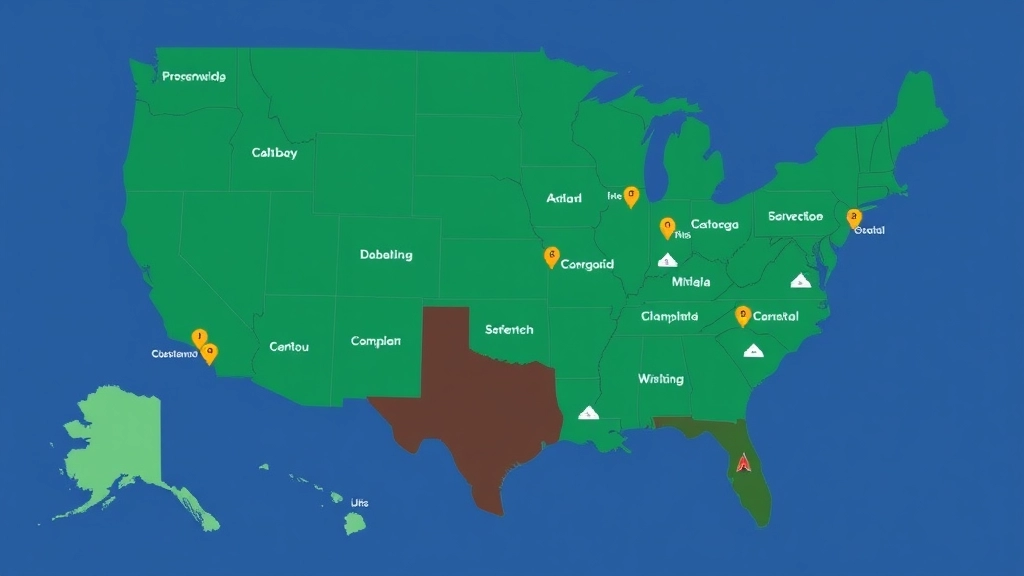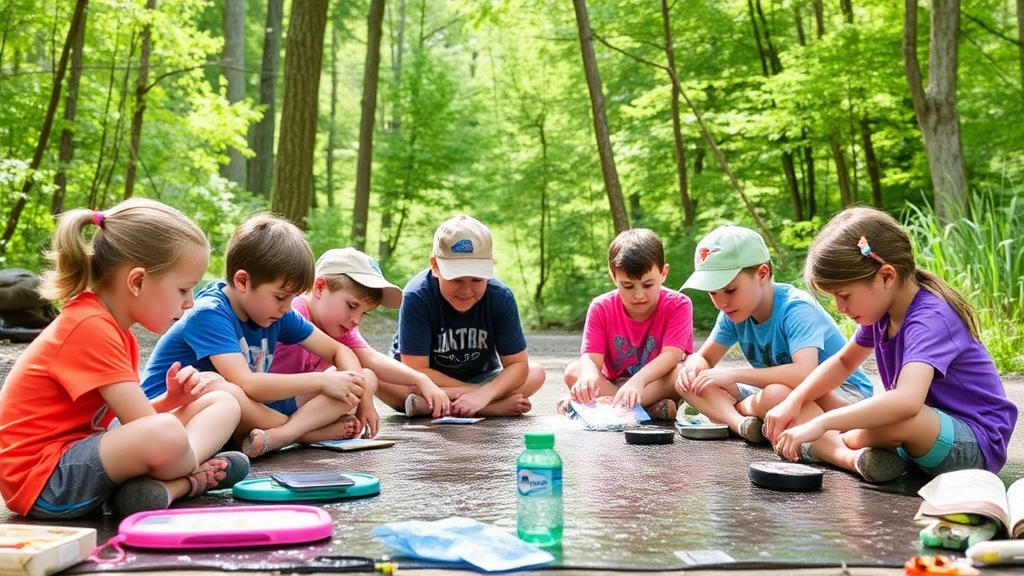Audubon Society Summer Camp
Looking for a summer camp that immerses your child in nature and wildlife? The Audubon Society Summer Camp offers a unique blend of outdoor adventure and ecological learning. Perfect for kids of various age groups, these camps are designed to foster a love for the environment through hands-on activities and exploration.
From birdwatching to nature hikes, the camp activities are both educational and fun, ensuring children gain a deeper understanding of the natural world. With locations across the U.S., flexible schedules, and a focus on safety, the Audubon Society Summer Camp is a fantastic choice for parents seeking an enriching summer experience for their kids.
Types of Audubon Summer Camps and Age Groups
Are you a parent wondering how to keep your kids engaged and learning during the summer? Or maybe you’re a teenager looking for an exciting way to spend your holidays while learning about nature? Audubon Summer Camps might just be the answer you’re looking for.
Overview of Audubon Summer Camps
Audubon Society offers a variety of summer camps tailored to different age groups. These camps are designed to foster a love for nature and wildlife, providing an enriching experience for children and teens alike. Here’s a breakdown of the types of camps and the age groups they cater to:
Little Explorers (Ages 4-6)
For the youngest nature enthusiasts, the Little Explorers camp offers a gentle introduction to the natural world. Activities are designed to be fun and engaging, helping kids develop a sense of wonder and curiosity.
- Nature Walks: Short, guided walks to discover plants, insects, and small animals.
- Story Time: Nature-themed stories to spark imagination.
- Crafts: Hands-on activities using natural materials.
Junior Naturalists (Ages 7-9)
Children in this age group are ready for more in-depth exploration and learning. The Junior Naturalists camp balances fun with educational content, ensuring kids gain valuable knowledge about the environment.
- Wildlife Observation: Learning to identify local flora and fauna.
- Ecology Games: Interactive games that teach ecological concepts.
- Nature Journaling: Encouraging kids to document their observations and thoughts.
Eco-Adventurers (Ages 10-12)
Eco-Adventurers camps are perfect for pre-teens who are eager to dive deeper into environmental science and outdoor skills. These camps offer a mix of adventure and education.
- Hiking Expeditions: Longer hikes to explore diverse ecosystems.
- Wildlife Tracking: Techniques for tracking and identifying animal signs.
- Conservation Projects: Hands-on projects that teach the importance of protecting nature.
Teen Naturalists (Ages 13-17)
For teenagers, the Teen Naturalists camp provides a more advanced and immersive experience. This camp is ideal for those considering a future in environmental science or conservation.
- Field Research: Conducting real scientific research in natural settings.
- Leadership Training: Developing skills to lead and educate others about nature.
- Advanced Ecology: In-depth study of ecological systems and conservation strategies.
Why Choose Audubon Summer Camps?
Audubon Summer Camps are more than just a way to keep kids busy during the summer. They offer a unique opportunity for children and teens to connect with nature, learn important life skills, and develop a passion for the environment. Whether your child is a budding naturalist or just loves being outdoors, there’s an Audubon camp that will provide a memorable and educational experience.
For more information on other exciting summer camps, check out our Top Summer Camps in Salem for Kids 2024 and the Complete Summer Camp Packet to ensure you’re well-prepared for any camp experience.
Camp Activities: Nature Exploration and Wildlife Learning

Ever thought about what your kids will do all summer?
Worried they’ll be glued to screens?
I get it.
That’s where Audubon Summer Camps come in.
Nature Exploration
Imagine your child exploring the great outdoors.
Not just any outdoors, but protected wildlife sanctuaries.
They’ll be:
- Hiking through forests
- Exploring wetlands
- Identifying plants and animals
It’s like a real-life adventure.
Wildlife Learning
Now, let’s talk wildlife.
Kids get hands-on experience with:
- Bird watching
- Insect identification
- Learning about local ecosystems
They’ll even get to see some critters up close.
Why It’s Awesome
Here’s why this rocks:
- Interactive learning: It’s not just reading from a book; it’s experiencing it.
- Teamwork: Kids work together on projects.
- Confidence: They build skills and self-assurance.
Real Stories
Take Lucy, an 8-year-old who attended last year.
She was shy and never liked bugs.
By the end of camp, she was leading her group in identifying different bird species.
Her mum couldn’t believe the transformation.
What Parents Say
Parents rave about it.
“Best decision ever,” says Mark, whose son attended last year.
“They learn so much and have a blast.”
So, if you want your kids to have an unforgettable summer, Audubon Summer Camps are the way to go.
They’ll learn, explore, and grow.
And who knows?
They might even come home with a newfound love for nature.
Ready to sign up?
Your kids will thank you.
Educational Benefits of Audubon Society Camps
Why Should You Consider Audubon Society Camps?
Ever wondered how to keep your kids engaged during the summer while also making sure they learn something valuable? Are you concerned about screen time and looking for a more enriching experience? Audubon Society Camps might just be the answer you’re seeking.
Real Learning in the Great Outdoors
Audubon Society Camps offer a unique blend of education and adventure. Here are some of the key educational benefits your child can gain:
- Hands-On Nature Exploration: Kids don’t just read about nature; they experience it firsthand. From identifying local flora and fauna to understanding ecosystems, every activity is designed to be interactive and engaging.
- Wildlife Learning: Campers get to learn about various wildlife species, their habitats, and conservation efforts. This practical knowledge is often more impactful than textbook learning.
- Environmental Stewardship: Children are taught the importance of protecting our planet. They participate in activities like recycling, composting, and even small-scale conservation projects.
- Scientific Inquiry: The camps encourage curiosity and scientific thinking. Kids learn to ask questions, make observations, and draw conclusions based on their experiences.
Skills Beyond the Classroom
The benefits aren’t just academic. Audubon Society Camps help children develop a range of life skills:
- Teamwork and Collaboration: Camp activities often require working in groups, helping kids to improve their social skills and learn the value of teamwork.
- Problem-Solving: Whether it’s figuring out how to set up a tent or identifying a bird species, problem-solving is a core part of the camp experience.
- Leadership: Older campers can take on leadership roles, guiding younger children and helping to organise activities. This fosters a sense of responsibility and boosts self-confidence.
Stories from the Field
Let me share a quick story. One camper, Maya, was initially shy and hesitant to participate. But as the days went by, she started to open up, asking questions about the different birds they encountered. By the end of the camp, she was leading a group of younger kids on a bird-watching expedition, confidently sharing her newfound knowledge. Maya’s parents were thrilled to see such a positive change in her.
The Long-Term Impact
The skills and knowledge gained at Audubon Society Camps have long-term benefits. Many former campers go on to pursue studies and careers in environmental science, biology, and conservation. Even if they don’t choose these fields, the appreciation for nature and the environment stays with them, influencing their choices and actions in adulthood.
Camp Locations: Centres Across the U.S.

Ever wonder if there’s an Audubon summer camp near you?
Finding the Perfect Spot
You might be thinking, “Where can I find an Audubon camp?”
Good news: these camps are all over the U.S.
Whether you’re on the East Coast, West Coast, or somewhere in between, there’s likely a centre nearby.
East Coast Wonders
Places like Maine and Massachusetts are hotspots.
Imagine your kids exploring the lush forests of New England.
They’ll get hands-on with nature, right in their backyard.
Midwest Adventures
Got a family in the Midwest?
Ohio, Illinois, and Minnesota have some incredible camps.
Think prairies, lakes, and endless wildlife.
West Coast Vibes
For those of you on the West Coast, you’re in luck too.
California and Washington have camps that let kids dive into coastal ecosystems.
From beaches to mountains, it’s all there.
Southern Comfort
Don’t forget the South.
States like Texas and Florida offer unique experiences.
Swamps, wetlands, and diverse wildlife are just a few highlights.
Why Location Matters
Choosing the right location isn’t just about convenience.
It’s about what your kids will learn and experience.
Different regions offer different ecosystems and wildlife.
Quick Tips for Choosing a Camp
- Proximity: How close is it to home?
- Ecosystem: What type of nature will they explore?
- Facilities: Are there good amenities?
- Reputation: What do other parents say?
Finding the right Audubon camp location can make a world of difference.
From the East Coast to the West Coast, there’s a perfect spot waiting for your child.
Camp Schedules, Pricing, and Registration
Ever found yourself wondering, “How do I fit an enriching summer camp experience into our already packed schedule?” or “Is this going to break the bank?” You’re not alone. These are the real questions every parent grapples with when considering summer camps. So, let’s break it down and make it as straightforward as possible.
Camp Schedules
Weekly Sessions: Audubon Summer Camps typically run in weekly sessions, making it easier to slot into your summer plans. Each session is tailored to specific age groups, ensuring your child gets the most out of their time.
Daily Timings: Most camps operate from 9 AM to 3 PM, but don’t sweat it if you need extra coverage. Many locations offer extended care options, both before and after the main camp hours.
Special Events: Some sessions include special evening or overnight events. Think of it as a mini-adventure within the camp, offering unique experiences like night hikes or stargazing.
Pricing
Base Fees: The cost can vary depending on the location and specific camp programme, but generally, you can expect to pay between £200 to £500 per week. This fee usually covers all activities, materials, and sometimes even meals.
Discounts: Early bird registrations often come with discounts. Additionally, some locations offer sibling discounts, making it easier on your wallet if you’re signing up more than one child.
Extra Costs: Be mindful of extra costs like extended care, special events, or optional field trips. These can add up, so it’s worth budgeting for these in advance.
Registration
Online Registration: Most Audubon camps offer a seamless online registration process. You’ll need to create an account, fill in the necessary details, and select your preferred sessions.
Waitlists: Popular sessions can fill up quickly, but don’t lose hope. Many camps offer waitlists, and spots do open up as plans change for other families.
Confirmation: Once registered, you’ll receive a confirmation email with all the essential details, including what to pack, drop-off and pick-up procedures, and any additional forms that need completing.
Refund Policies: Life happens, and plans can change. Make sure to read through the camp’s refund policy. Some camps offer partial refunds if you cancel within a certain timeframe, while others might provide a credit for future sessions.
If you’re looking for more detailed information on specific camps, check out our comprehensive guide on top summer camp providers and tips. For those interested in a unique experience, consider exploring our Natural History Museum summer camps for kids.
Safety Protocols and Inclusivity at Audubon Camps

Ever worried about sending your kid to camp?
You’re not alone.
Safety and inclusivity are massive concerns for parents.
So, how does Audubon handle it?
Let’s break it down.
Safety First, Always
Safety is the bedrock of Audubon camps.
From the moment your kid steps in, we’ve got it covered.
Here’s how:
- Trained Staff: Every counsellor is CPR and First Aid certified. They know what to do in emergencies.
- Strict Supervision: Low camper-to-staff ratio ensures every kid gets attention.
- Emergency Plans: Detailed protocols for everything from bee stings to natural disasters.
- Health Checks: Daily health screenings and hygiene protocols to keep everyone in tip-top shape.
Inclusivity Matters
Audubon camps are for everyone.
We mean it.
Here’s what we do to make sure of that:
- Accessible Facilities: Campsites are designed to be accessible to all kids, including those with disabilities.
- Diverse Programs: Activities cater to different interests and abilities. No one’s left out.
- Cultural Sensitivity: Staff are trained in cultural competence. Respect and inclusion are non-negotiable.
- Anti-Bullying Policies: Zero tolerance for bullying. Period.
Real Stories, Real Impact
Take Sarah, a mum from New York.
She sent her son, who has autism, to an Audubon camp.
She was nervous, but the staff were phenomenal.
Her son thrived, made friends, and learned tons about nature.
No worries, just pure joy.
Why It Matters
Because when your kid is safe and included, they can focus on what matters: learning, growing, and having fun.
And that’s what Audubon camps are all about.
Final Thoughts
Safety and inclusivity aren’t just buzzwords at Audubon camps.
They’re the foundation.
So, you can relax knowing your kid is in good hands.
Ready to sign up? Check out our registration page and get started.
Financial Aid and Scholarships for Campers
Worried about the cost of sending your child to an Audubon summer camp? You’re not alone. Many parents grapple with the financial aspect of providing enriching experiences for their kids. But here’s the good news: the Audubon Society offers various financial aid and scholarship options to make their camps accessible to everyone.
Why Financial Aid and Scholarships Matter
Let’s be realâsummer camps can be expensive. But these camps offer invaluable experiences that foster a love for nature and wildlife. Financial aid and scholarships ensure that all children, regardless of their financial background, have the opportunity to benefit from these enriching programs.
Types of Financial Aid Available
Audubon Society provides several types of financial assistance:
- Need-Based Scholarships: These are awarded based on the financial need of the family. You’ll typically need to provide some financial documentation to qualify.
- Merit-Based Scholarships: These are given to campers who demonstrate exceptional interest or talent in areas related to nature and wildlife.
- Community Grants: Some local Audubon centres offer grants funded by community donations or partnerships with local businesses.
How to Apply
Applying for financial aid or scholarships is straightforward but does require some preparation. Here’s a step-by-step guide:
- Gather Financial Documents: Have your income statements, tax returns, and any other relevant financial documents ready.
- Fill Out the Application: Most centres have an online application form. Make sure to fill it out completely and accurately.
- Submit a Personal Statement: Some scholarships require a short essay or personal statement from the camper. This is an opportunity for your child to express their passion for nature and why they want to attend the camp.
- Meet Deadlines: Ensure you submit all required documents before the application deadline. Late submissions are usually not considered.
Real Stories: How Financial Aid Transformed Lives
Take Sarah, for example. Sarah’s family couldn’t afford the full camp fee, but thanks to a need-based scholarship, she attended the Audubon summer camp last year. She came back with a newfound love for birds and even started a birdwatching club at her school. Her experience shows that financial aid doesn’t just make camp possible; it can have lasting impacts.
Tips for a Successful Application
- Be Honest: Provide accurate financial information. Misrepresentation can lead to disqualification.
- Highlight Passion: Encourage your child to write a heartfelt personal statement. Passion can often tip the scales in your favour.
- Seek Recommendations: Some applications allow for recommendation letters. A glowing recommendation from a teacher or community leader can strengthen your case.
For more tips on how to prepare your child for camp, check out our top summer camp lesson plan themes for engaging kids. Additionally, if you’re looking for camps in your area, you might find our guide on best summer camps in Athens, GA for 2024 helpful.
Junior Counselors and Leadership Opportunities

Ever wondered how your teen can gain leadership skills while having a blast in nature?
Look no further than the Junior Counselors programme at Audubon Summer Camps.
Why Consider the Junior Counselor Role?
- Leadership Skills: Teens step up, lead activities, and manage younger campers.
- Nature Immersion: They get to explore the wild, learn about wildlife, and share their knowledge.
- Community Impact: They become role models, teaching younger kids to appreciate nature.
What Do Junior Counselors Do?
- Assist Camp Leaders: Help with daily activities, from nature hikes to wildlife spotting.
- Mentor Younger Campers: Guide and support younger kids, ensuring they have a great experience.
- Learn and Teach: Absorb knowledge from experts and pass it on.
Real Talk: What’s in It for Your Teen?
- Skills for Life: Leadership, communication, and responsibility.
- College Applications: Stand out with unique experiences.
- Friendships: Meet like-minded peers who care about the environment.
How to Join?
- Application Process: Simple and straightforward. Just fill out a form.
- Training: Comprehensive training sessions to get them ready.
- Commitment: Usually a few weeks in the summer. Flexible schedules available.
Stories from the Field
I remember chatting with Emma, a former Junior Counselor. She told me how leading a group of 8-year-olds on a bug hunt was a game-changer for her confidence. She’s now studying environmental science and credits her time at Audubon for sparking that passion.
Benefits Beyond the Camp
- Networking: Connect with professionals in environmental fields.
- Hands-On Experience: Real-world skills that textbooks can’t teach.
- Personal Growth: Discover strengths and interests they never knew they had.
Ready to Sign Up?
Don’t wait. Spots fill up fast.
Get your teen involved in a programme that’s more than just a summer job.
It’s a stepping stone to a brighter future.
Keyword: Junior Counselors
Got questions? Drop them in the comments or check out our FAQ section.
Cheers to a summer of growth and adventure!
Parent Testimonials and Success Stories
Worried about sending your kid off to camp?
I get it.
It’s natural to have concerns.
But let me tell you, the Audubon Summer Camps are a game-changer.
Real Stories from Real Parents
- Sarah from Manchester: “I was anxious about my daughter being away from home for a week. But she came back more confident and full of stories about the wildlife she discovered. She even made a new best friend!”
- Tom from Bristol: “My son was always glued to his screen. After a week at Audubon Camp, he’s now obsessed with birdwatching and can’t wait to go back next year. It’s a win-win!”
Success Stories That Speak Volumes
- Confidence Boost: Kids come back more self-assured. They’ve tackled new challenges and made it through, which gives them a huge confidence boost.
- New Friendships: Social skills soar. Campers bond over shared experiences and interests in nature, making friendships that last beyond camp.
- Educational Growth: They’re not just having fun; they’re learning. From identifying bird species to understanding ecosystems, the knowledge they gain is invaluable.
Why Parents Love Audubon Camps
- Safe Environment: Every parent wants their child to be safe. Audubon Camps have strict safety protocols. From trained staff to secure facilities, you can breathe easy.
- Inclusive Atmosphere: These camps are for everyone. They celebrate diversity and ensure every child feels welcome.
- Financial Aid: Worried about the cost? Audubon offers scholarships and financial aid to make the experience accessible for all families.
The Bottom Line
Parents rave about Audubon Summer Camps because they see the difference it makes.
Confidence.
Friendships.
Learning.
It’s not just a camp; it’s a transformative experience.
So, if you’re on the fence, take it from other parents who’ve been there.
Your child will thank you.
And you’ll be glad you made the leap.
For more information on other great options, check out our Top Worcester Summer Camps for Kids and Teens and the Ultimate Guide to Summer Sailing Camp for Kids and Teens.
Frequently Asked Questions (FAQs) About Audubon Society Summer Camp
What are the main activities at Audubon Summer Camps?
Audubon Summer Camps focus on nature exploration and wildlife learning. Kids engage in activities such as hiking through forests, exploring wetlands, identifying plants and animals, bird watching, and learning about local ecosystems.
Where are Audubon Summer Camps located?
Audubon Summer Camps are available across the U.S., including the East Coast, Midwest, West Coast, and Southern states. Locations include Maine, Massachusetts, Ohio, Illinois, Minnesota, California, Washington, Texas, and Florida.
What safety protocols are in place at Audubon Camps?
Safety is a top priority at Audubon Camps. Protocols include trained staff certified in CPR and First Aid, strict supervision with a low camper-to-staff ratio, detailed emergency plans, and daily health screenings and hygiene protocols.
How does Audubon ensure inclusivity at their camps?
Audubon Camps are designed to be inclusive for all children. This includes accessible facilities, diverse programs catering to different interests and abilities, staff trained in cultural competence, and strict anti-bullying policies.
What is the Junior Counselors program?
The Junior Counselors program offers teens the opportunity to gain leadership skills while immersing themselves in nature. They assist camp leaders, mentor younger campers, and learn about wildlife, all while developing valuable life skills.
What benefits do Junior Counselors receive?
Junior Counselors gain leadership, communication, and responsibility skills. They also enhance their college applications, build friendships with like-minded peers, and receive hands-on experience that textbooks can’t provide.
How can my teen join the Junior Counselors program?
The application process is simple and involves filling out a form. Comprehensive training sessions are provided, and the commitment usually spans a few weeks in the summer with flexible schedules available.
What do parents say about Audubon Summer Camps?
Parents rave about the camps, noting the educational value and the fun their children have. Testimonials include comments like “Best decision ever” and stories of children gaining confidence and a newfound love for nature.
Why choose an Audubon Summer Camp for my child?
Audubon Summer Camps offer interactive learning experiences, teamwork opportunities, and confidence-building activities. Children learn, explore, and grow in a safe and inclusive environment, making it an unforgettable summer experience.
How do I sign up for Audubon Summer Camps?
Ready to sign up? Visit the registration page on the Audubon Society’s website to get started. Spots fill up fast, so don’t wait!
References
-
Audubon Summer Camps: Nature Exploration and Wildlife Learning
-
Camp Locations: Centres Across the U.S.
-
Safety Protocols and Inclusivity at Audubon Camps

